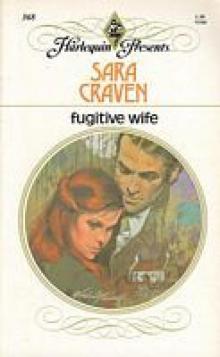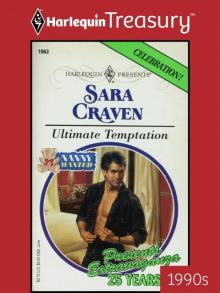- Home
- Sara Craven
Inherited by Her Enemy Page 16
Inherited by Her Enemy Read online
Page 16
Ginny tried not to flinch as he dealt with the awkward fastening, the brush of his fingers against her nape a brief but telling agony.
‘You can manage your dress?’
‘Oh, yes.’ Her response and involuntary recoil were both too hasty, as she was reminded of how the night might have ended. Of the taffeta slipping to the floor with a rustle like autumn leaves as Andre undressed her. His hands lingering in erotic persuasion as he explored her naked flesh.
Let me know that you belong to me.
At least she hadn’t said yes to him, with all the hideous embarrassment that would have led to under the circumstances. But being spared such an aftermath was no real consolation, although perhaps that too would seem different in the morning.
She thought, I can only hope.
She summoned a travesty of a smile. ‘Well—goodnight.’
He was already turning away. ‘Bonsoir, Virginie, et dors bien.’
Nodding jerkily, she headed for the door. Walked without hurrying to the stairs and climbed them steadily. Then began to run, as if pursued by demons, to the room that was still nominally hers and closed the door on her fragmenting world.
‘Oh, it’s you,’ said Cilla listlessly. She was reclining against her pillows looking enchanting in a low-cut blue silk nightdress trimmed with lace, a tray holding a barely touched breakfast on the bed beside her.
No amount of designer dresses could ever turn me into competition for her, Ginny thought with a pang. She moved the tray and sat down.
‘Not hungry?’
Cilla shrugged. ‘Not for bread and jam. Is that all that passes for breakfast round here?’
‘Pretty much, although you can have croissants or pains au chocolat if you ask before the trip to the boulangerie. And there are eggs, of course.’ Ginny tried a smile. ‘I’ve just fed the hens.’
‘Aren’t there servants to do that? The woman who gave me that revolting drink last night, for instance.’ Cilla shuddered. ‘I thought she was trying to poison me, and this morning she turns up with breakfast. No wonder I have no appetite.’
Ginny said quietly, ‘What’s gone wrong, Cilly-Billy? I mean between you and Jon?’
Cilla’s head lifted sharply at the idiotic childhood nickname. But instead of delivering the expected blast, she seemed to be fighting tears.
She said huskily, ‘Nothing that wasn’t already a problem. But I suppose going to the Seychelles brought it all to a head. It was only when we were on the plane that I found Mother had deliberately left the phones behind, so we couldn’t be contacted. “Bothered with stupid questions” was how she put it. When we got to the hotel, I tried to call Jon, but his mother answered and I knew she’d only give me a hard time, so I hung up. After all, she’s never liked me, and finding that I’m penniless hasn’t helped one bit.’
She added bleakly, ‘I should have left him to you, but Jon was the catch of the neighbourhood, as Mother never failed to point out. And, to be honest, I fancied being lady of the manor and living in that beautiful house.
‘What I didn’t want was the endless talk about horses and farming and Lady Welburn’s lectures on gardening, and the importance of a good mulch. And certainly not for the rest of my life.’
‘You can’t mean that,’ Ginny protested.
‘Actually, I do.’ Cilla played with the embroidered edge of the sheet. ‘The Seychelles gave me time to think, and I realised that if Jon was my one true love, I’d never have simply gone off like that—or done a lot of other things either. So I was all set to suggest we should think again. Only he beat me to it.’
She chewed at her lip. ‘You see, I paid Andre a visit at his hotel one afternoon, and one of the chambermaids saw me leaving his room. By the time I got back, the word had spread as far as Welburn Manor.
‘Jon came right out with it. Demanded I tell him what had happened.’ She shrugged. ‘And I said, “Wouldn’t you like to know?” and handed back his ring.
‘So I had to tell Mother,’ she added wryly. ‘And then all the real hell broke loose.’
She shuddered. ‘She started screaming at me, telling me I must be insane. That I’d humiliated her in front of the entire neighbourhood, and she’d never forgive me. That I could starve in the gutter because there wasn’t a chance in hell of her letting me scrounge off her, or saddling Howard with me either.’
Ginny’s head was spinning, but she managed to ask, ‘Who is Howard?’
‘The man she met playing bridge at our hotel. Quiet, quite nice-looking, living in Hampstead and all set to be our next stepfather. Or mine, anyway,’ she added. ‘I don’t think she’s mentioned you.’
‘But she’s only just been widowed,’ said Ginny. ‘Does he know that?’
‘Don’t be silly. She spotted him and had him attached to her side before the end of the first week. She’s quite an operator, our ma.
‘And, of course, this time the marriage will have no strings attached because he has a son and heir already.’
‘What do you mean?’
Cilla shrugged again. ‘Apparently she and Andrew had an agreement. He wanted a legitimate heir. She promised she could provide him with one. But she’d had a bad time when I was born, and somehow persuaded her doctor to perform some procedure to ensure she’d never get pregnant again. A “tubal ligation”, she called it. She thought that she could fob Andrew off with some excuse for her failure to produce, but eventually he insisted they both had tests, and the truth came out.’
Ginny drew a sharp breath. ‘Oh, my God. He must have told Andre and that’s why he called her a cheat.’
‘But she didn’t see it like that,’ said Cilla. ‘She wanted money and comfort, so, to her, the end justified the means. It still does, because I don’t think she’s any more in love with Howard than she was with Andrew.’
She glanced round the spacious, pretty room. ‘After all, you seem to have fallen on your feet,’ she commented with acerbity. ‘Who would have thought it?’
Ginny bit her lip and rose. ‘I’m sorry you’ve had such a difficult time, but I’m sure Mother will come round eventually. In the meantime, I’m sure Andre will let you remain with us while you sort out your future.’
‘Oh, I know that already,’ Cilla said, smiling up at her with a kind of lazy contentment, her eyes shining. ‘He visited me earlier—so sweet of him— and said I could stay as long as I wanted. So that’s all right.’
Ginny nodded and headed for the door, where she turned, longing to leave but impelled to speak.
Her voice shook a little. ‘Cilla, tell me, please. What did happen in Andre’s hotel room that afternoon?’
Her sister’s smile deepened to mockery. ‘Wouldn’t you like to know,’ she said.
And she began to laugh as Ginny, feeling sick, stumbled from the room.
CHAPTER TWELVE
AS THE LONG, agonisingly slow days passed into weeks, Ginny began to feel that she’d become a bystander in her own life, watching helplessly from a distance as Cilla morphed into the role of Andre’s future wife.
It was achieved with great charm and an eagerness to learn she had never displayed before. Baron Bertrand, having recovered from the shock of her arrival, was now openly indulgent. Even Madame Rameau, inclined at first to eye the newcomer askance, had been won over and was actually teaching Cilla the basics of cooking.
She’d pretty much taken over the daily shopping too, Ginny watching and listening in envious admiration as Cilla chatted away to the shopkeepers and stallholders in what seemed to be flawless French, courtesy, of course, of her stay at that exclusive establishment in Switzerland.
At other times, she was immersing herself in every aspect of the life of the domaine, displaying what seemed to be a genuine interest in the complex production of fine wines, and spending several hours a day among the vin
es or in the chai. Discussing what she had learned in the evening, over the dinner table.
As I never did, Ginny acknowledged unhappily. Because I told myself that it was dangerous to become too involved. That to do so would only make it harder to say goodbye when the time came.
So I can hardly start asking questions now, not without appearing jealous, which would embarrass me and everyone else. Especially Andre.
They were still, she supposed, officially engaged to be married, but an engagement could easily be ended as Cilla had demonstrated, particularly as the wedding itself had not been mentioned since the night of the fete.
On the few occasions when she found herself alone with Andre, the only topic of conversation, raised quietly and politely, was her health.
‘Clothilde tells me you are still being sick,’ he’d commented recently.
‘As soon as I wake up each morning,’ she’d returned ruefully. ‘I could almost set my watch by it.’ She paused. ‘But she tells me it will stop very soon.’
His brief smile was wintry. ‘I am glad to hear it for your sake.’ And left her.
What he never mentioned was that other early morning when he’d told Cilla she could stay. Leaving Ginny free to guess at what else might have been said. To guess and, accordingly, to suffer...
Nor had he ever expressed, by word or look, the slightest interest in sleeping with her again. Instead he was spending his nights at La Petite Maison. Probably not alone.
But she did not let herself think about that, concentrating instead on how the problem of her expected baby could be resolved. What happened when a man fathered a child by a girl he no longer wanted? After all, he could hardly expect his new bride to raise another woman’s child, especially when the mother was her own sister.
It was an impossible situation and she quailed at its implications.
The most equitable solution, she supposed, would be for Andre to allow her to return to England as she’d requested so often in the past and have the baby there. He was, she knew, too honourable to stint on financial support, and she could work part-time until the child was of school age.
And if her mother was truly planning to remarry with such scandalous haste and live in London, maybe she could occupy the empty Keeper’s Cottage in Rosina’s place.
According to her most recent letter from Mrs Pel, who’d become a regular correspondent, her mother’s absence as well as Cilla’s broken engagement was still providing ample sustenance for the local gossips. And the new regime at the café had not found favour with the customers, who were staying away in droves. ‘I’m told Iris Potter is thinking of selling up,’ she wrote.
I suppose I could revert to Plan A, Ginny thought with a sigh. Take another shot at becoming the new Miss Finn.
But wherever she went and whatever she did, it seemed likely that Andre would want to establish and maintain contact with his child and some kind of regular access would have to be agreed, however painful she would find it.
And repeating over and over again that she only had herself to blame did nothing to dispel the growing desolation that haunted her.
The attitude of Monique Chaloux only added to her wretchedness. ‘The little sister,’ she’d exclaimed effusively. ‘Quelle enchanteresse. Quelle jolie blonde. No wonder all the men, including Monsieur Andre, have been rendered bouleversé by her presence.’
‘No wonder indeed,’ Ginny agreed expressionlessly, aware that Mademoiselle’s goading remarks were almost certainly intended to punish her for having introduced the new computer system which Monique had still failed to master.
In a way, Ginny was almost grateful for the constant errors that had to be corrected, the deletions needing to be painstakingly retrieved, the data assigned to the wrong files or even omitted altogether.
After all, apart from occasionally walking Barney, she had little else to occupy her. And at least putting the mistakes right gave Ginny a sense of purpose and stopped her brooding, as well as improving her own computer skills, something which, she told herself resolutely, would stand her in good stead for the future. Back in England. Alone.
But, in turn, she struggled to understand the labyrinthine filing system of Mademoiselle’s devising which seemed, in some inexplicable way, to swallow up letters, invoices and bank statements, never to be traced again. So maybe the end result was a draw, she told herself with a shrug, quelling the odd feeling of uneasiness which could be ascribed to any number of causes.
Including the understandably strained atmosphere at the château.
So when a spell of fine spring weather led to Andre’s suggestion that they should undertake the delayed visit to Beaune, she agreed without hesitation, even if the trip was more for Cilla’s pleasure than her own.
After the peace of Terauze, the sudden confluence of busy main roads with large lorries thundering past as they neared their destination came as something of a shock to the system, but this was soon forgotten as Ginny caught her first sight of Beaune, sheltered securely by its striking medieval walls.
‘Oh, it’s gorgeous,’ she exclaimed impulsively as Andre turned through an arched gateway into a labyrinth of narrow streets, and saw him smile.
‘That was also the opinion of your beau-père when I brought him here,’ he said, slotting the car neatly into an empty parking space. ‘Now we shall walk a little. Nothing is too far away.’
He guided them both through another maze of quaint, cosy streets into a square dominated by a massive building, a spire rising above its forbidding stone walls.
Is this where they dispose of unwanted visitors? Ginny wondered mordantly as they crossed to an entrance made no more cheerful by the massive door knocker depicting a salamander eating a fly.
Will you come into my parlour? she chanted under her breath. And took a step into a different world. One that stopped her in her tracks, gasping with a delight as wholehearted as it was unexpected as she found herself in a cobbled courtyard, staring at one of the most amazing buildings she’d ever seen in her life.
It was clearly very old, its creamy stones almost golden in the early spring sunlight, but it was the colourful design that entranced her, from the slender pillars of the arcade that supported the ornate upper balcony up to the beautiful dormer windows.
And above them the kind of roof she’d never seen before, its tiles glazed and geometrically patterned in spectacular green, rust and black against a golden background, with gilded weathervanes soaring towards the sky.
She turned to Andre. ‘What in the world is this place?’ Her voice was husky.
‘The Hotel-Dieu, built six centuries ago by Nicholas Rolin, Philippe le Bon’s Chancellor, as a hospital for the poor.’ His mouth twisted. ‘Perhaps, as the King of France remarked, to make amends for all those he’d helped to impoverish. Whatever Rolin’s motives, it has become a symbol of our region, its decoration reminding Burgundians of their Flemish roots.’
‘Is it still a hospital?’
‘No, a museum. The sick and elderly were moved to modern buildings some forty years ago. But all of them, including the Hotel-Dieu, are still maintained by the Hospices de Beaune charity which Nicholas and his wife established.’
Ginny looked back with awe at the astonishing façade. ‘That must take some doing.’
Andre shook his head. ‘Not when the charity owns some of the greatest vineyards in Burgundy. And in November, during the Trois Glorieuses, their new vintages are sold by auction to buyers from all over the world, raising five to six million euros.’
‘Is that when they light the candle and have to bid before it burns out?’ asked Cilla eagerly.
He grinned. ‘No, that is only for the most important lot—La Pièce de Presidents—usually with a celebrity auctioneer encouraging the feeding frenzy.’
Cilla sighed. ‘Oh, I would love to be there and see that.�
�
Andre said quietly, ‘Then all you need do is stay here. You know the choice is yours.’
Ginny had the oddest sensation that the brightness of the day had faded as she watched him look down gravely and searchingly into her sister’s upturned face. As she saw the exquisite, brilliant colour rise in her cheeks, and heard her murmur something shy, confused, and most un-Cilla-like before she turned away.
Because she knew all that shy radiance could mean only one thing.
That this time Cilla was genuinely and deeply in love.
And glancing at Andre, she saw him smile with quiet, deep satisfaction as he led the way into the Hotel-Dieu and felt her heart turn over in agony.
The interior was just as astonishing and, under other circumstances, Ginny would have revelled in the history of the place, from the neat alcove bedrooms of the Great Hall, all facing towards the painted woodcarving of Christ on the altar at the end of the long room to the enormous painting of the Last Judgement in the tapestried salle specially built to house it.
But now I have to make my own judgement, she thought wryly, pain building inside her as she obediently studied the immense detail of the painting through one of the magnifying glasses supplied to visitors as if her life depended on it.
I know it can never be right to wreck three lives, she thought, so I must be the one to leave, even if I am condemning myself to a hell of regret. But will that be any worse than being with a man who has only married me out of duty?
Yes, Cilla will be shocked and hurt when she finds out about the baby, as she eventually must, but, loving him, she’ll surely forgive him. And loving her, he’ll stay faithful in future. And they’ll be happy together.
I have to believe that. Have to...
When, at last, they re-emerged into the sunlight, Ginny, still wretchedly preoccupied with her bleak thoughts, took a clumsy step and stumbled on the cobbles.
‘Fais attention, ma mie.’ Andre was beside her, taking her hand, his arm encircling her in support. A simple action, but it sent a shiver of uncontrollable, unbearable response reverberating through every nerve-ending in her body.

 The Marchese's Love-Child (The Italian Husbands)
The Marchese's Love-Child (The Italian Husbands) Inherited By Her Enemy (HQR Presents)
Inherited By Her Enemy (HQR Presents) His Wedding-Night Heir (Wedlocked!)
His Wedding-Night Heir (Wedlocked!) The Token Wife
The Token Wife Mistress on Loan
Mistress on Loan Deceived (Harlequin Presents)
Deceived (Harlequin Presents) Fugitive Wife
Fugitive Wife Desperate Measures
Desperate Measures Ultimate Temptation (Harlequin Presents)
Ultimate Temptation (Harlequin Presents) The Highest Stakes of All
The Highest Stakes of All Ruthless Awakening
Ruthless Awakening Rome's Revenge
Rome's Revenge Forced Bride
Forced Bride Summer of the Raven
Summer of the Raven Smokescreen Marriage
Smokescreen Marriage The Innocent's Shameful Secret
The Innocent's Shameful Secret Marriage by Deception
Marriage by Deception The Virgin s Wedding Night
The Virgin s Wedding Night The Forced Marriage (Italian Husbands)
The Forced Marriage (Italian Husbands) The Innocent's Sinful Craving
The Innocent's Sinful Craving Inherited by Her Enemy
Inherited by Her Enemy Wife in the Shadows
Wife in the Shadows The Innocent's Surrender
The Innocent's Surrender Storm Force
Storm Force The Seduction Game (Harlequin Presents)
The Seduction Game (Harlequin Presents) The Santangeli Marriage
The Santangeli Marriage In the Millionaire's Possession
In the Millionaire's Possession The Forced Marriage
The Forced Marriage Alien Vengeance
Alien Vengeance A Nanny for Christmas
A Nanny for Christmas His Reluctant Bride
His Reluctant Bride Heart of a Hero
Heart of a Hero The Price of Retribution
The Price of Retribution Irresistible Temptation
Irresistible Temptation Dark Apollo
Dark Apollo Marriage at a Distance (Presents, 2093)
Marriage at a Distance (Presents, 2093) Count Valieri's Prisoner
Count Valieri's Prisoner The Innocent's One-Night Confession
The Innocent's One-Night Confession Bartaldi's Bride
Bartaldi's Bride His Untamed Innocent
His Untamed Innocent The Marriage Proposition
The Marriage Proposition The Right Bride?
The Right Bride? The End of her Innocence
The End of her Innocence